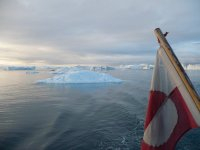
Practical information
Damien Degeorges, a Junior Researcher at the French Institute of Strategic Research (IRSEM) and PhD candidate in Political Science, provided a wealth ofinformation concerning the geopolitical, energy, environmental and security position of Greenland in the Arctic.
- According to Degeorges, Greenland is a "laboratory" of the challenges at stake in the Arctic, especially in terms of climate change, natural resources, and geopolitics.
- Being a ‘hyper-market" of energy and a keyeconomic investment for China, Greenland advances to be the nucleus of global energy security with its vast supply of rare earth elements.
- Greenland today faces three challenges according Degeorges: economic autonomy in the long term; its capacity to educate its population to tackle Greenlandish issues properly; and its capacity to open its mind to international affairs, i.e. understand what role it can play and how other actors behave with it.
This debate was part of the "Ifri's Tuesdays in Brussels".
You can find the main quotes on Twitter: @IfriBxl. You can find above Degeorges' presentation.




